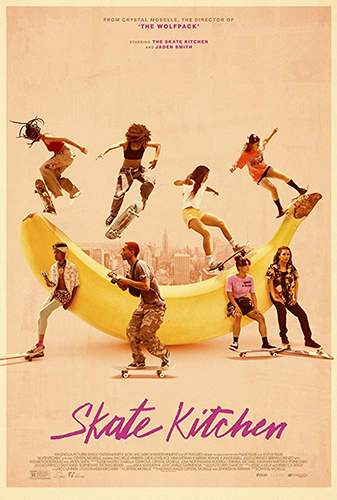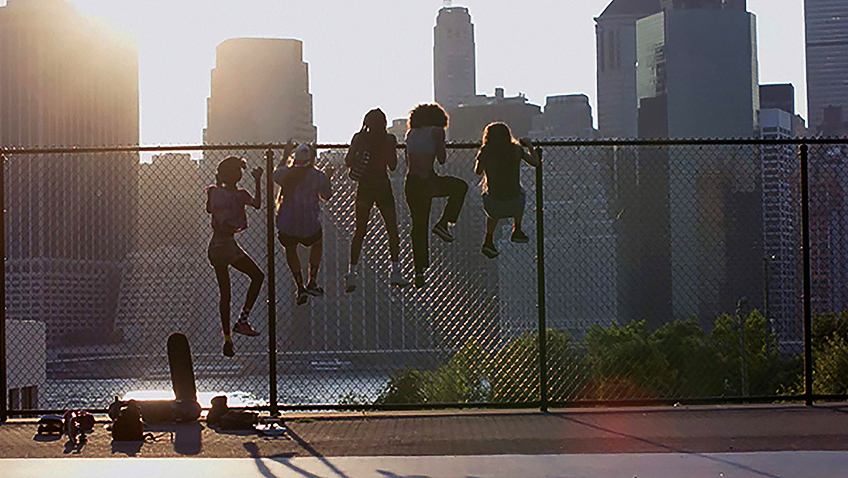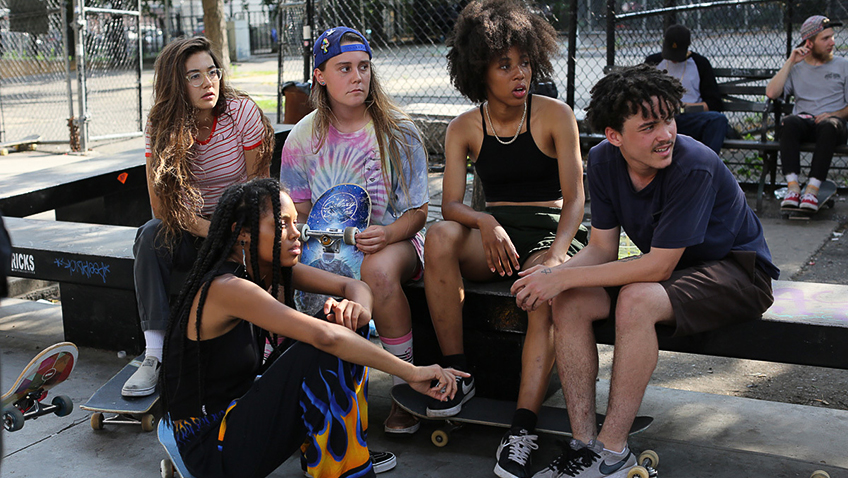Joyce Glasser reviews Skate Kitchen (September 28, 2018), Cert. 15, 106 min.
Before the 2001 documentary Dog Town and Z-Boys, skateboarding was more an annoyance than a sport. But professional surfer and skateboarder Stacy Peralta’s film, (when the surf was down, surfers took to the land) and the terrific biographical 2005 follow-up, Lords of Dogtown, which Peralta wrote, elevated the clunky pimpled teenager’s toy to another level. The nagging fact remained that, even in these films’ titles, skateboarding was a young man’s sport and the competitions were as gender specific as the NFL. You have only to visit the promenade of the Southbank Centre in London to see that not much has changed in the skateboarding world.
 Crystal Moselle’s film Skate Kitchen about a girl’s skateboarding group might change the status quo. Fortunately, it is also an enjoyable look into the private world of a New York girl’s squad and their newest member, Camille (skateboarding sensation Rachelle Vinberg) an outsider who comes-of-age as she struggles to fit in.
Crystal Moselle’s film Skate Kitchen about a girl’s skateboarding group might change the status quo. Fortunately, it is also an enjoyable look into the private world of a New York girl’s squad and their newest member, Camille (skateboarding sensation Rachelle Vinberg) an outsider who comes-of-age as she struggles to fit in.
While the girls in Skate Kitchen are independent, sexually active and smoke weed throughout the day (there is little evidence that they earn a living or go to school) they are a happy, caring and welcoming bunch, so, no angels, but no juvenile delinquents either. Camille, on the other hand, is from Long Island, so far away from the group’s frame of reference, that it might as well be New Jersey. She is a pretty 18-year-old who lives with her Spanish speaking single mother (Elizabeth Rodriguez) in a comfortable home and is neither sexually active nor interested in drugs. Her passion is skateboarding, but when, in an opening scenes, she suffers a major injury – symbolically, she is bleeding between her thighs – he mother pulls the plug on that outlet, making Camille promise to give up the board.
This is a big mistake both for mother and daughter and for the film, as there is no reason why her mother would take such drastic action when her daughter is 18 and all sports people suffer injuries. It is a trope in this kind of film and provides an excuse for Camille to live among the Manhattan girls, but it never really rings true.
In any event, Camille might be a virgin, but she is a teenager who questions authority and is learning what she can get away with it (lowering the board from her window with a rope like an illicit lover) and what she can’t do without. Active on social media where she has a modest following, her skateboard gives her an identity and the social life that for some reason, she is lacking. When Camille comes home with the board and is greeted unexpectedly by her mother, the two argue and Camille leaves home.
The film comes into its own when Moselle and co-writers Aslihan Unaldi and Jen Silverman transport their protagonist into the world of the Skate Kitchen (of which Vinberg is the real life co-founder) and leave her to navigate through the social dynamics of this girl group. Some of it will be familiar to anyone who remembers their teenage years where belonging to a clique is everything. Some of it isn’t familiar to us and proves problematic for Camille, too.
It helps that Camille is easy going, smiling, takes a back seat with her new friends and goes along with their questions and friendly jibes, from her home in Long Island to the embarrassing moment when her mum – sacrilege – comes to the skate park.
You can see the elation in Camille’s eyes when she is accepted into the group and treated as one of their own. But the main reason why the girls welcome her so enthusiastically is that she can skate, and the scenes with the group riding their boards through the busy streets at sunset have a certain poetry as well as a joie de vivre.
It’s a steep learning curve as Camille catches onto the jargon and manages to stay cool at a party where she notices everyone making love and the abrasive, tom-boy-looking Kurt (Nina Moran) making out with another girl.
Homeless, Camille crashes at the home of Janay (Ardelia Lovelace), but trouble brews when Camille starts to hang out with a dye-haired boy skater (played by ‘The Karate Kid’ star Jaden Smith, Will Smith’s son), who becomes a possible love interest. What Camille does not take into account is that Janay has a history with her new friend and there is rivalry between the girl/boy groups.
After an exciting night skate with the boys, Camille accepts her new friend’s offer to sleep on the sofa room and has to ignore the boys’ sexist banter and the pornography they are watching on TV. They happily ignore Camille’s discreet presence, and she is relieved.
Moselle’s previous break-out film was The Wolfpack, a documentary about 7 children raised within the confines of their lower East Side apartment and homeschooled. Skate Kitchen is not a documentary but the first time actresses or more less play themselves. They are remarkably good at recreating the small talk and banter that would naturally be an integral part of their social lives, even if the long conversation about tampons since out of place for such savvy and independence New York girls.
The naturalness of the acting and the skate boarding itself (there could have been more) are what make this film special. And here’s one ‘sports’ film that does not end up with a big competition in which the teary-eyed underdog triumphs. Camille’s triumph is more modest; even if Rachelle Vinberg, the woman behind the character has become a media celebrity.
You can watch the film trailer here:




